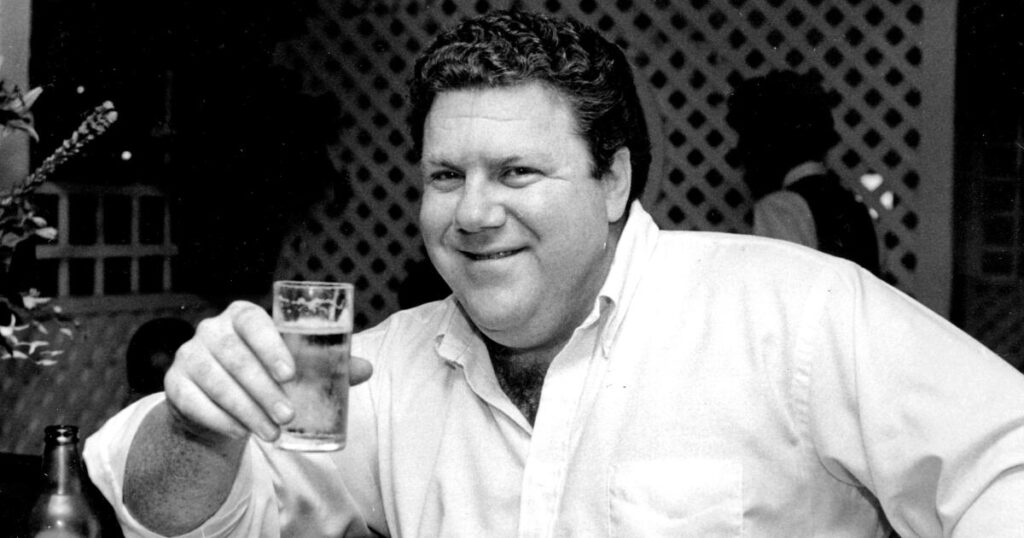George Wendt, who will be famous as long as television is remembered as Norm from “Cheers,” died Tuesday. He passed in Los Angeles, where he lived, though the cities to which he is spiritually tied are Boston, where the show was set, and Chicago, where he was born and entered show business by way of Second City, and which he unofficially represented throughout his life, and which claimed him as one of its own. One of his last Facebook posts, earlier this month, as a Chicagoan educated by Jesuits, was, “pope leo XIV is a sout’ sider my friendts. his cassock size is 4XIV.”
Entering stage right, as the assembled cast shouted his name, Norm would launch his heavyset frame across the set to a corner stool where a glass of beer — draft, never bottled — would appear as he arrived. He was the quintessence of Regular Guy, a big friendly dog of a person, with some of the sadness that big, friendly dogs can carry.
“Cheers,” which ran for 11 seasons from 1982 to 1993 — Wendt appeared in every one of its 275 episodes — was a show about going where everybody knows your name but also, as in life and fiction, a place for people who had nowhere better to be, or nowhere else to go. Though Norm was nominally an accountant, and then a house painter, his real job was to sit and fence with John Ratzenberger‘s font-of-bad-information postman Cliff Clavin — they were one of the medium’s great double acts — and drink beer, and then another. His unpaid tab filled a binder. (“I never met a beer I didn’t drink,” quoth Norm, though there was never any suggestion of alcoholism, or even of drunkenness.)
But as a person with work troubles and a marriage that could get the better of him — Wendt’s own wife, Bernadette Birkett, supplied the voice for the off-screen Vera — he was also the vehicle for some of the show’s more dramatic, thoughtful passages. (That his service to the series was essential was borne out by six Emmy nominations.) Unlike some other “Cheers” regulars, there was no caricature in his character. His woes, and his pleasures, were everyday, and he played Norm straight, seriously, without affectation, so that one felt that the Wendt one might meet on the street would not be substantially different from the person onscreen.
Like many actors so completely identified with a part, Wendt, who spent six years with Second City, worked more than one might have imagined; there were dozens of appearances on the small and big screen across the years, including his own short-lived “The George Wendt Show,” which took off on public radio’s “Car Talk.”
After “Cheers,” he’s perhaps most associated with the recurring, Chicago-set “Saturday Night Live” sketch “Bill Swerski’s Superfans.” But he also did theater, including turns on Broadway as Edna Turnblad in “Hairspray,” as Yvan in Yasmina Reza’s “Art” and as Santa in the musical adaptation of “Elf.” There was “Twelve Angry Men,” with Richard Thomas in Washington, D.C., and he was Willy Loman in “Death of a Salesman” in Waterloo, Canada. In Bruce Graham’s “Funnyman,” at Chicago’s Northlight Theatre in 2015, he played a comic cast in a serious play, breaking out of typecasting.
We were connected on Facebook, where he regularly liked posts having to do with music and musicians; he was a fan, and sometimes a friend, of alternative and underground groups, and tributes to him from that quarter are quickly appearing. (When asked, he would often cite L.A.’s X, the Blasters and Los Lobos as among his favorites.) One of his own last posts was in memoriam of David Thomas, leader of the avant-garde Pere Ubu, twinned with “kindred spirit” Chicago Bears defensive tackle Steve McMichael, who died the same day.
Once, after he messaged me to compliment an appreciation — like this — I’d written about Tommy Smothers, I took the opportunity to ask, “Do I correctly remember seeing you at Raji’s a million years ago, probably for the Continental Drifters?” Raji’s, legendary within a small circle, was a dive club in a building long since gone on Hollywood Boulevard east of Vine Street; it wasn’t the Roxy, say, or other celebrity-friendly spots around town — or for that matter, anything like “Cheers,” except in that it served as a clubhouse for the regulars.
“Yep,” he replied. “Tough to get out like I used to, but please say hi if you see me around.” Sadly, I never did, and never will.
